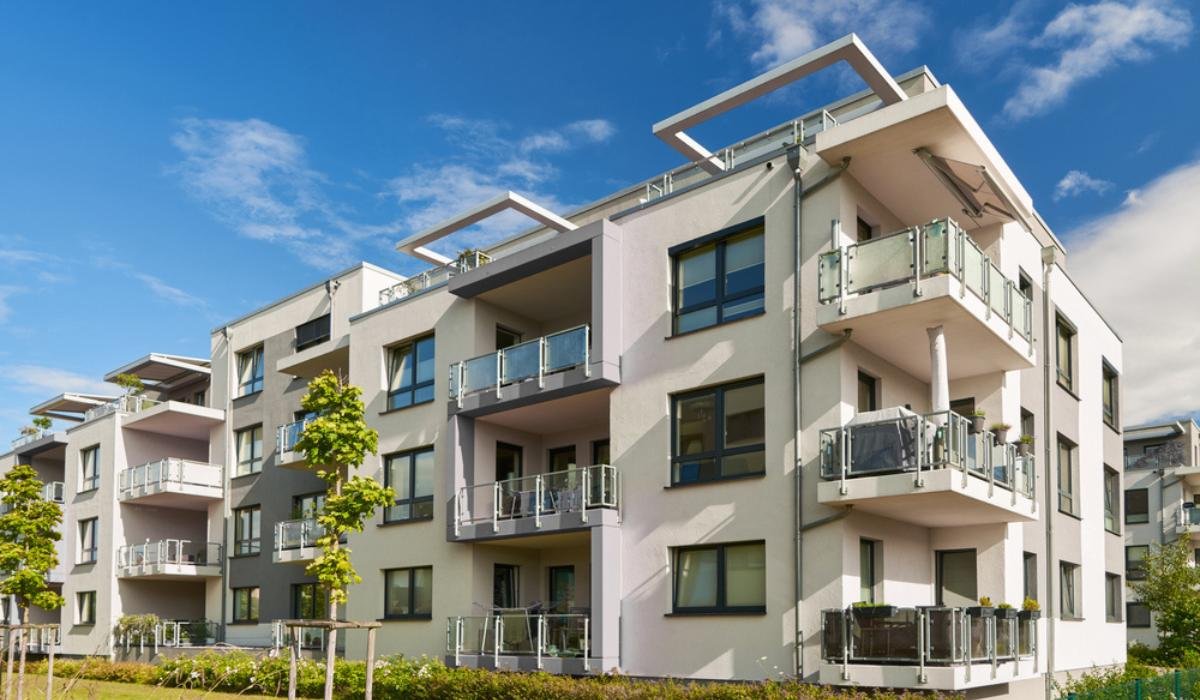The phrases “flats” and “apartments” are sometimes used synonymously in the real estate industry, creating confusion over their differences. It can be essential for prospective homeowners to know the distinctions between these two kinds of homes in order to make wise choices. Let’s explore the main contrasts, buying inclinations and pros and downsides of apartments and flats.
See also: Vastu for flats and apartments
A flat is a separate dwelling area found in a bigger house complex or structure. The United Kingdom and other European nations frequently use this word. Apartments are usually made up of one main unit with a kitchen, living room, bathroom and bedrooms. The main difference is in the linguistic norm; in areas where this language usage is common, “flat” is the favoured term.
The definition of an apartment is a separate living area housed inside a larger residential building. In the US and a few other countries, this phrase is frequently used. Similar to flats, apartments consist of a single unit that includes a kitchen, living room, bathroom and bedrooms. The main distinction is the preference for local language; in places where this linguistic practice is prominent, “apartment” is the more commonly used adjective.
The term “flat” is a widely used term to describe these types of living quarters in the UK and other European countries. Conversely, “apartment” is the favoured phrase in the US and other countries. The main causes of the discrepancy are linguistic and cultural standards.
The physical characteristics of apartments and flats are remarkably similar. In both cases, a single, independent unit is situated inside a bigger structure or complex. Typically, these apartments have a kitchen, a living room, a bathroom and bedrooms. The semantics and cultural norms surrounding their use reveal the subtle differences between the two.
The decision between an apartment and a flat is frequently impacted by cultural conventions, geographical norms and individual preferences. The term “flat” is widely accepted in the United Kingdom, where it is firmly embedded in common parlance. On the other hand, “apartment” is the term that is more frequently used in the United States.
Psychological associations might also have a subtle effect on purchasing preferences. While “flat” may be thought to have a more traditional or classic connotation, some people may equate the term “apartment” with a more modern and cosmopolitan lifestyle. It’s important to understand, though, that these correlations are arbitrary and might differ greatly between people.
When conducting real estate deals, it is crucial to comprehend the local linguistic customs and cultural backgrounds. Using the term “apartment” when “flat” is more common could cause confusion, or vice versa. For this reason, understanding and being mindful of these linguistic quirks is essential to productive communication in the real estate industry.
In conclusion, although “flat” and “apartment” refer to comparable living situations, language convention and cultural influences have a major role in determining which term is used. The physical characteristics of the dwelling stay the same and personal tastes have a big impact on how each phrase is seen to be associated.
The choice between an apartment and a flat is primarily based on personal preferences, way of life and location. The appropriateness of each term is determined by personal preferences and regional linguistic customs rather than any inherent superiority.
Practically speaking, a buyer should avoid becoming bogged down by the jargon and instead concentrate more on the particulars of the property itself. More important variables to consider while making an informed decision include location, size, amenities and overall design.
Benefits of flats
Cultural appeal
There may be a cultural benefit to referring to something as “flat” in areas where it is the norm. It might indicate a linguistic and cultural affinity for the area.
Perceived charm
Some connect the word “flat” to a certain kind of charm or personality, frequently connected to old buildings or a sense of neighbourhood.
Disadvantages of flats
Possible misunderstanding
Using “flat” instead of “apartment” could cause misconceptions in areas where “apartment” is the accepted term, particularly in real estate transactions.
Limited global recognition
The term “flat” may not be widely recognised when talking globally, which could lead to issues in cross-border transactions.
Benefits of apartments
Worldwide recognition
The word “apartment” is widely understood throughout the world, which facilitates communication about the kind of accommodation being discussed, particularly when interacting with people from other countries.
Modern connotations
For those looking for modern living arrangements, the term “apartment” may evoke images of a more cosmopolitan and modern way of life.
Disadvantages of apartments
Cultural disconnect
Calling something an “apartment” in a place where “flat” is the term of choice could sound strange or less in line with local customs.
Perceived lack of charm
Sometimes people mistakenly believe that an “apartment” is a more sterile or temporary living space and they link the word with a lack of character or a sense of community.
Points to keep in mind while looking for flat or apartment
Local language and preferences
Recognise the preferences and norms of the local language with reference to housing terms. This is particularly crucial when conducting business with real estate.
Concentrate on property attributes
Give the property’s particular attributes top priority rather than getting bogged down in jargon. Take into account elements like location, size, facilities and general design.
Personal associations
Consider the meanings you personally associate with terms such as “apartment” and “flat.” Think about the ways in which these connections could affect how you view a property.
International considerations
Keep in mind the widely used phrase while thinking about real estate in a foreign setting. In a diversified and international real estate industry, using “apartment” could facilitate easier communication.
Consulting professionals
When in doubt, seek advice from real estate experts who can tailor their advice to your unique requirements and are knowledgeable about regional linguistic customs.
The decision between an apartment and a flat ultimately comes down to personal preferences, cultural norms and regional language standards. The terms “flat” and “apartment” are frequently used to refer to identical self-contained living quarters within larger residential complexes, therefore the main distinction between the two is linguistic. The choice between the classic appeal of “flat” and the cosmopolitan ring of “apartment” generally comes down to personal associations and regional linguistic norms. It’s important to understand that these living spaces’ functionalities and physical characteristics are strikingly similar when navigating the real estate market. Knowing these small language quirks as tenants or buyers can improve communication in the real estate industry and facilitate a more seamless house-hunting experience. The choice between an apartment and a flat is ultimately a subjective one that is impacted by language customs, cultural background and individual preferences.
FAQs
No, the terms do not inherently affect the property's features. Focus on specific attributes like location, size and amenities.
Yes, understanding and respecting local language conventions is crucial, especially in real estate transactions.
The choice of term itself does not impact property value. Property value is determined by various factors, with terminology playing a minimal role.
Prioritise factors like location, size, amenities and overall design over the terminology used to describe the property. Is there a significant difference between flats and apartments?
Which term is more globally recognised?
Do the terms affect the property's features?
Should I prioritise regional language conventions?
Are there cultural associations with the terms?
Does the choice of term impact property value?
What should I prioritise when buying a property?
| Got any questions or point of view on our article? We would love to hear from you. Write to our Editor-in-Chief Jhumur Ghosh at [email protected] |

Upasana Mandhata, currently in her final year of Law, is pursuing a BA LLB Degree at VIT University Chennai. Her interest in content creation dates back to her school and college years when she discovered a writing passion. Drawing from personal experiences, her writing style has been shaped by her journey and encounters. She enjoys experimenting with new recipes, painting, or swimming while clocking out of work time.











